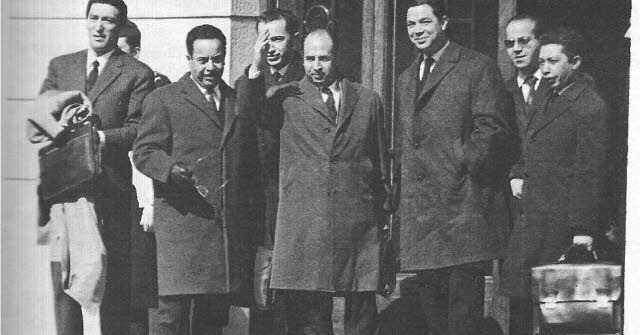“To commemorate is not to celebrate”, insisted on the Élysée. It is a question of sparing all susceptibilities less than a month before the first round of the presidential election while the date of March 19, 1962, which marks the entry into force of the ceasefire between the French army and Algerian separatists, remains an explosive subject. The human toll of the war is terrible: between 260,000 and 400,000 dead on the Algerian side, 30,000 on the French side (soldiers and Europeans from Algeria), several tens of thousands among the harkis.
How will the commemoration take place?
A reception will be held at the Elysée this Saturday, during which Emmanuel Macron will deliver a speech. The Head of State will not give “an official historical line”, one explains in his entourage to the newspaper L’Opinion.
About 200 people, harkis, repatriates, Algerian militants or soldiers, are invited to the Elysée, as well as elected officials from the South of France, including the mayors of Amboise, Montpellier and Nice. The objective of “reconciling” and “appeasing” remains the same as during the previous memorial meetings of the five-year period around the Algerian war. Emmanuel Macron wanted, through a series of memorial gestures, “to reconcile France and Algeria” as well as the “compartmentalized memories” in France, recalled the Elysée.
The Evian Accords: what are they?
On March 18, 1962, Louis Joxe, Minister of State for Algerian Affairs, announced that the French delegation and the members of the National Liberation Front (FLN) had reached an agreement to put an end to the fighting that had been going on since November 1, 1954 in Algeria.
The document decrees a ceasefire. And sets the conditions for the settlement of the conflict and defines the future relationship between France and Algeria “if the solution of independence and cooperation is adopted”. The text mainly provides for the organization of a referendum.
From April 8, the French are invited to vote on the Evian agreements, which they approve at 90.81%. In Algeria, a referendum of self-determination takes place on July 1, 1962 and the “yes” wins with 99.72% of the votes cast. “
The city of Evian, in the French Alps, was chosen because it was close to Switzerland where the Algerian separatists were staying. These agreements officially put an end to 132 years of French colonization.
Writing
Why is the date not unanimous?
“This ceremony will be essentially Franco-French, that is to say without the Algerians. The ambassador of Algiers was indeed invited to the reception, but it is not certain that he will be present”, underlines the Opinion.
Attacks by the OAS (anti-independence), exactions against the harkis or the massacre of Oran against the Europeans took place after March 19, the date of the ceasefire. This is the reason why it is not unanimous among the “carriers” of Franco-Algerian memories.
“All the events linked to the war in Algeria did not end overnight with the signing of the Evian agreements”, conceded the Elysée, citing in particular the shooting in the rue d’Isly in Algiers, in which dozens of supporters of French Algeria were killed by the army on March 26, 1962.
Why did the President of the Republic’s remarks cause controversy?
On the plane that brought him back in January 2020 from Israel, where he was taking part in the commemoration of the 75th anniversary of the liberation of the Auschwitz camp, Emmanuel Macron felt that France “perhaps had a job to do” on the memory of the Algerian war in order to put an end to the “memory conflict”.
During the previous election campaign in 2017, Emmanuel Macron had already created controversy by describing colonization as a “crime against humanity”. “I am very lucid about the challenges that I have in front of me from a memorial point of view, and which are political. The war in Algeria is undoubtedly the most dramatic. I know that from my campaign. It is there, and I think it has roughly the same status as the Holocaust for Chirac in 1995,” declared the President of the Republic.
“It’s indecency. He confuses the war in Algeria with the worst genocide in human history! “Senator LR Bruno Retailleau moved in Le Figaro on Saturday. “These words are both madness for history and memory, and a time bomb for our future,” said LR MEP François-Xavier Bellamy. “Comparing the Holocaust to the war in Algeria is obscene. Emmanuel Macron is in full drift,” said the president of the National Rally, Marine Le Pen.
The Élysée then rejected any comparison between the Holocaust and the Algerian war. “It’s the absolute crime that cannot be compared to any other,” said Emmanuel Macron, noting the “most extreme singularity” of the Holocaust.
What are Emmanuel Macron’s gestures of appeasement?
Last January, Emmanuel Macron sent a strong gesture to returnees from Algeria. He described as “unforgivable for the Republic” the shooting of the rue d’Isly in Algiers in March 1962, and considered that the “massacre of July 5, 1962” in Oran should be “recognized”.
Still for the sake of appeasement, on March 15, the French ambassador to Algeria, François Gouyette, laid a wreath on the stele erected in Algiers in honor of Mouloud Feraoun and the five other victims. Jean-Philippe Ould Aoudia, son of one of the six inspectors of social centers killed by the OAS, however deplores in Liberation that the victims of the terrorist organization were not honored during larger official commemorations. “Harkis, Charonne, March 26, 1962, Europeans, October 17, 1961… Emmanuel Macron has toured the memories. One remains. Why does he not honor that of civilians, soldiers, Algerians, French, magistrates, elected officials, teachers, police officers killed by the OAS? “.
